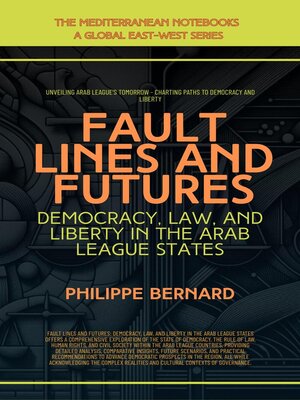Fault Lines and Futures
ebook ∣ Democracy, Law, and Liberty in the Arab League States · The Mediterranean Notebooks
By Philippe Bernard

Sign up to save your library
With an OverDrive account, you can save your favorite libraries for at-a-glance information about availability. Find out more about OverDrive accounts.
Find this title in Libby, the library reading app by OverDrive.



Search for a digital library with this title
Title found at these libraries:
| Library Name | Distance |
|---|---|
| Loading... |
Mr Philippe Bernard's work offers a comprehensive and timely analysis of democracy, rule of law, human rights, civil society, and individual freedoms across the 22 Arab League member states. This region, characterised by diverse political systems, historical trajectories, and sociocultural contexts, presents a complex landscape for evaluating these fundamental pillars of governance and social well-being.
The book adopts a multidimensional approach. Firstly, it provides detailed analysis of each nation, examining current situations through constitutional frameworks, electoral processes, judicial independence, freedom of expression, assembly and press, minority rights protection, and civil society organisation dynamism. The analysis draws from various sources including international human rights organisations' reports, academic research, and legal documents.
Secondly, the work conducts comparative analysis, identifying common challenges, divergent paths, and best practices amongst Arab League states. This comparison highlights factors contributing to strengthening or weakening democratic institutions and respect for rule of law and human rights, considering political history, economic development, religious and cultural norms, external influences, and regional/international actors' roles.
Thirdly, the text transcends present-day snapshots to offer future perspectives. The book develops three distinct scenarios for the region's future over the next decade, ranging from optimistic projections (increased democratisation and rights respect) to status quo scenarios (limited progress or stagnation) and pessimistic scenarios (democratic backsliding and increased authoritarianism). Each scenario builds upon thorough analysis of current trends and potential change drivers.
Crucially, the work maintains a normative character, proposing concrete, achievable recommendations tailored to both governing elites (government officials, political leaders) and civil society leaders (activists, NGOs, journalists, intellectuals) in each country. These recommendations aim to strengthen democratic institutions, promote rule of law, protect human rights, foster dynamic independent civil society, and safeguard individual freedoms.
This book serves as a valuable resource for policymakers, academics, civil society organisations, international bodies, and anyone interested in the Arab world's future. The analysis avoids both Western-centric assumptions and cultural relativism that excuses human rights violations, instead drawing upon Arab intellectual traditions supporting rights and freedoms, recognising that democracy must develop organically within cultural contexts whilst respecting universal human dignity principles.







